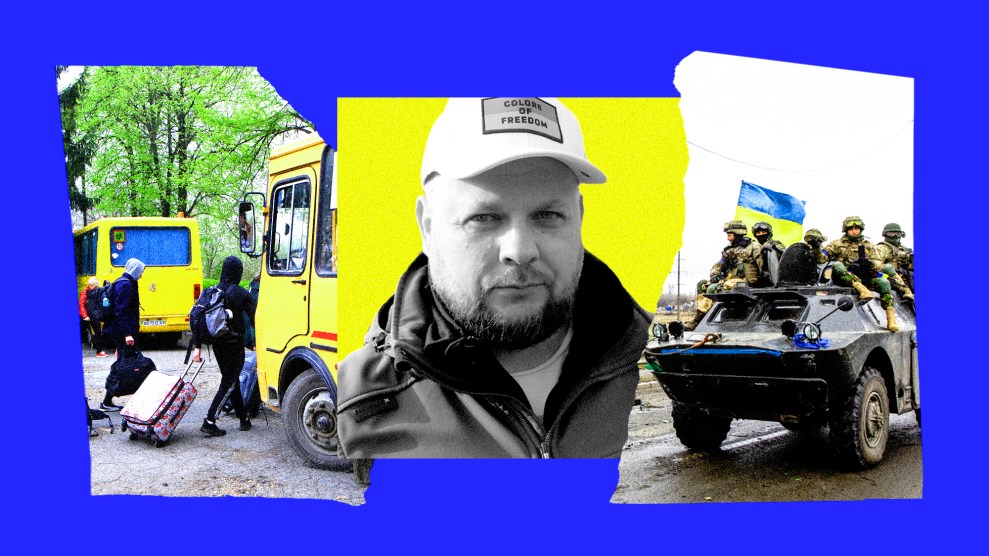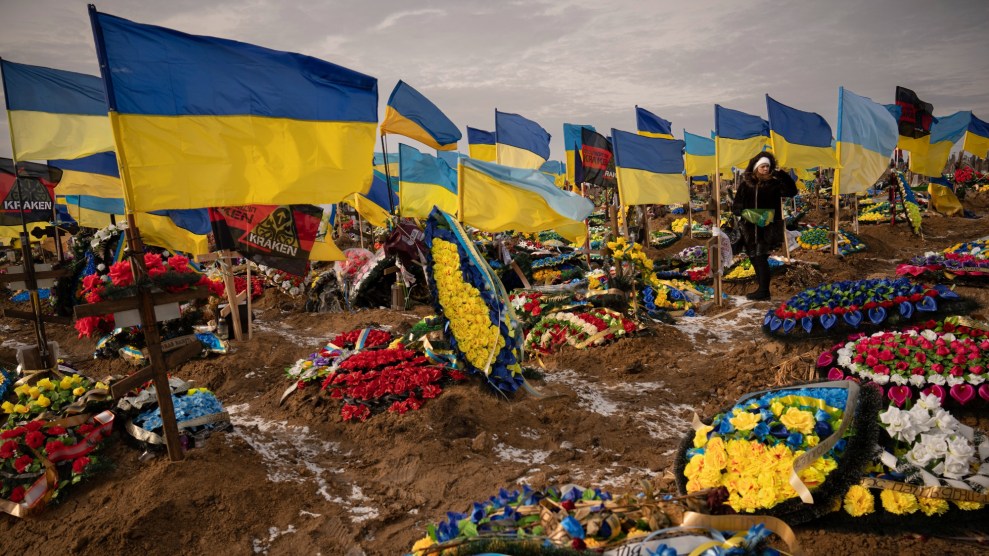
Mother Jones illustration; Vyacheslav Madiyevskyy/ Ukrinform/Future Publishing/Getty; Mykhaylo Palinchak/SOPA/Sipa/AP/Oleksandr Palikot
The messages left on the group chat are the record of a modern-day exodus. “There is only one way out of Melitopol,” the group chat administrator cautioned on September 20, referring to the Russian-occupied city in southern Ukraine. “There are not any safer routes!!!” Other messages are more personal. “Looking for a spot for a 45-year-old woman from Melitopol,” one woman wrote on October 15, “will have a suitcase and a small dog.”
A little over a year ago, none of the nearly 23,000 subscribers to the group chat would have thought that they’d flee their city, let alone that they would need to worry about being killed or injured from gunfire, artillery, or missiles en route. According to one poll cited by Al Jazeera, less than 5 percent of Ukrainians believed that Russia would launch a full-scale invasion in February 2022.
Just a few weeks later, on February 24, 2022, Russia did just that.
Ukrainians, though, displayed a remarkable capacity not only to mount a robust military offensive but also to bounce back from their collective shock and survive often punishing circumstances. During my six months of reporting in Ukraine, I’ve seen countless examples. A friend quit university studies in the US to launch an NGO from scratch that supplies medical supplies to soldiers. On the front, I’ve encountered civilians who voluntarily joined the armed forces despite having no military experience. A Ukrainian journalist friend went from covering Ukraine’s parliament to filing reports right from the front line.
But I keep remembering one man, who seems to embody so much of the grit, resilience, and creativity repeated elsewhere. A native of Melitopol, a city of around 150,000 on the flat farm fields of southern Ukraine, Alexander Lyubishko looks like the construction worker he once was—bearded, constantly in a baseball cap, and stocky. He founded the group chat on messaging app Viber that helps refugees leave Russian occupation in Melitopol, and his story reveals just how much Ukrainians have achieved over one year of this unexpected war — and how some of them have been changed in the process.
We met in early February in the southern city of Zaporizhzhya, which I visited amid reports that it will very likely be the jumping-off point for a major Ukrainian counter-offensive in spring. I found him while looking online for people involved in the evacuation of civilians from Russian territory, after previously covering a similar—albeit much smaller—group in the Kherson region. Just minutes after I messaged Lyubishko on his Instagram account, he wrote me back. Lyubishko is, in fact, constantly online, posting to raise money through updates on his group’s work. Within a few days of speaking online, I met him in a tiny bakery in the city of Zaporizhzhya in southeast Ukraine.
Now 37 years old, he was well-traveled and had lived a full and varied life before Russia’s invasion. At 19, he volunteered to join a Ukrainian Baptist missionary group on a preaching mission to Russia’s far north, a place he returned to often twice a year for months at a time to work with Russian animist communities like the Nenets. The Nenets, one of Russia’s many ethnic minorities, are reindeer herders who number less than 50,000 and live along 68,200 square miles on Russia’s Arctic coast. Oppressed by the Tsarist and Soviet governments, the Nenets now face the threat of modern Russian oil drilling that damages the environment they depend on for raising reindeer.
He offered logistical support, shuttling missionary families across huge distances in the underpopulated Nenets Autonomous region, driving them to the hospital, and delivering food. “I got hooked on nature, the north, the wilderness,” he said. “But I understood that Russia wasn’t a normal place.”
His first son, now 13 and the oldest of four children, was born when he lived in Russia. The Nenets, in a strange twist of fate, now are serving in Ukraine as soldiers. In mid-March, the son of the deputy governor of the Nenets Autonomous region died while invading Ukraine as part of an elite Russian airborne regiment. “Either I was a really bad missionary, or they were thickheads,” said Lyubishko, reflecting on how men who could have been his pupils were now invading his country.
He then made a drastic career pivot in 2015 and spent a total of nine months working as a construction worker in the US, driving through Colorado, Texas, Nevada, and California and learning rudimentary English in the process. The US is “very close to my mentality,” he said, eagerly throwing in the English he knows at every opportunity in our interview, which was mostly conducted in Russian. An avid fisherman, he had dreams of moving to Alaska, but his family was denied immigration status.
So after a year of back-and-forth travel to Ukraine, Lyubishko returned to Melitopol for good. While on a fishing trip, he made friends with the owner of a building material store. It was a fortuitous encounter. Together, in 2019 they launched a construction company that eventually grew to 500 people with work all over Ukraine.
The flowering of their company coincided with the general economic improvement of Ukraine’s once neglected regional cities, like Melitopol, that were scattered far away from Kyiv. The Soviet-looking city, all concrete block apartment buildings, and massive factories had been a place many young people chose to move away from. But starting around five years ago, two successive mayors brought new life to his city, Lyubishko said, a time when government reforms tied to Ukraine’s pro-European protest movement also began. The mayors sought out foreign investment, partnering with a Canadian government economic development initiative and attracting EU money.
The memory of this chapter of Melitopol’s history is still vivid for Lyubishko. He compares Hamburg, Germany, where his family now lives as refugees, unfavorably to his home city. “We walk around Hamburg—an international city,” he notes, “and we say to ourselves, Melitipol was better.” In a video from Melitopol’s New Year’s celebration in 2022, just two months before the invasion, drone shots show a city adorned with stylish Christmas lights.
Lyubishko’s serene and prosperous life in Melitopol fractured when Russia launched its full-scale invasion of Ukraine on February 24. Blitzing north from Crimea, Russian forces entered the city by February 25. After mass protests and vows of non-cooperation from the city’s mayor, Ivan Fedorov, Russia began a campaign of repression. Over 1,000 people have been abducted by Russian forces, Fedorov said in January, and hundreds of those who were abducted are still not released.
Lyubishko himself only had fleeting contact with the Russian troops. On the first day of occupation, he went to get an electrical generator from a furniture factory he owned only to find that the occupying Russians had already started turning the factory into a military base. A Russian officer escorted him, initially at gunpoint, to get the generator. “Let’s have a chat,” the Russian told him. The two spoke for an hour, Lyubishko said. The officer was confused—fed on Russian propaganda, he had expected to be met by flowers from a thankful Ukrainian public. Instead, the invasion had united Melitopol in hatred of Russia. “Nothing did more for Ukrainian unity” than the invasion, Lyubishko said.
On the morning of February 27, Lyubishko packed up his family into the car and hit the road with four other families. Using his knowledge of the roads from his fishing trips, he made an 80-mile detour and bypassed the areas of active fighting to arrive before nightfall in Zaporizhzhya, a city still under Ukrainian control.
That initial trip would prove to be the inspiration for the organization he created. The next day, a friend messaged, shocked that Lyubishko had been able to cross into Ukrainian territory. Lyubishko sent him the directions. Then a friend of a friend posted on Facebook that Lyubishko knew how to bypass the battles then raging between Russia and Ukraine and make it safely to Ukrainian-held territory. Suddenly, his phone was ringing constantly. Within that week, he provided directions to five cars of people, then ten, then twenty. Soon, he professionalized the process, creating a group on the chat messenger Viber where six of his former employees would organize evacuations in groups of ten cars and communicate with chosen convoy leaders.
He never communicated directly with the convoys. Amid widespread instances of Russian soldiers detaining Ukrainian citizens, as reported by Melitopol mayor Ivan Fedorov and others, he learned that the Russians were now looking for him. One friend of a friend, with whom he had never communicated, was stopped at a Russian military checkpoint on the road. The Russians set up numerous checkpoints across the occupied territory in order to control the movement of Ukrainians and hunt for Ukrainian veterans and other targets. The Russian soldiers searched the man’s phone and found Lyubishko’s phone number. Despite his protestations that he didn’t even know Lyubishko, the man was thrown into an improvised Russian jail for a day.
Lyubishko’s organization, which is named after him, eventually began direct evacuation support as well. With funding in part from German churches—he has raised about $54,000 over the course of his work—he sent buses to the occupied territories and ferried people out. He also connected with a community of people who provided paid evacuation. In return for Lyubishko’s assistance in resolving their problems with Ukraine’s tight controls on exit from Ukrainian-held territory, the drivers reserved spots on their buses for free evacuations.
The act of crossing was itself fraught with danger and administrative complications. Refugees were crossing an active front line, across which Russia was trying to advance. While none of the refugees that Lyubishko helped have died, he said that many people trying to evacuate perished as a result of the shelling. Then there was the issue of navigating an inscrutable bureaucracy. The Russians appeared to be working without any kind of coherent plan. Soldiers at one military checkpoint might not allow refugees through for days, and then suddenly grant them passage. At another, they might require refugees to present certain documents, and then the next day require different ones. “We joked that one day they’d only let out people with green eyes,” he said, “and the next only with brown eyes.”
The confusion had its advantages. Lyubishko’s brother was serving in the Ukrainian army in the southern city of Mariupol when war broke out. After being knocked unconscious in shelling, when he regained consciousness hours later, he and his unit discovered they were surrounded by the enemy. Sneaking out in civilian clothes, Lyubishko’s brother made it to an area around 100 miles away near Melitopol. An acquaintance had advised him to use a small road near the town of Tokma, but Lyubishko knew better. He knew that this particular road had a Russian checkpoint with an extensive list of Ukrainian service members who would be detained on sight. If detained, Lyubishko’s brother would likely face imprisonment and torture, if not outright execution. A larger arterial road nearby had no such list, so Lyubishko diverted his brother to that route instead.
The complexities of the roads, the haphazard Russian presence, and the continuing fighting along the front line meant that Lyubishko had to build his own informant network in order to understand which routes were best. He built up a kind of informal database of safe and dangerous roads from detailed questioning of drivers who had returned from the occupied territories. He also maintained contact with a host of people who stayed in the occupied territories and would send him information. Sometimes, through intermediaries, they would also grease the wheel by bribing Russians at the checkpoints. “Every week was a new quest,” he said. “Here they’d let people through, there they wouldn’t.”
As the chaos of the war’s early months settled, by July the Russians reduced travel from Russian-occupied territory to Ukrainian-held territory to one single road. In mid-December, they cut off that road as well. From the time that the evacuations had begun, though, at least 50,000 people used their services. The real number is likely higher, Lyubishko said, since others would join the car convoys without informing his group’s moderators.
With the closing of the evacuation routes, Lyubishko’s mission changed. Today, most of his work involves raising money for the military, with a smaller operation focused on finding and sending medical supplies to Melitopol. Insulin is particularly lacking, Lyubishko said, amid widespread insulin shortages in Russia itself.
Russian troops, though, often interfere. Occasionally medical supplies have been thrown out by soldiers who assured the drivers that there was no need for them since Russia was well stocked. One man from Ukraine brought in medicine by traveling through Belarus to Voronezh in Russia, then through Crimea and to Melitopol, turning what would have been a 77-mile journey from Zaporizhzhya to Melitopol to one over a thousand miles long.
The messages in the group chat still trickle out today, despite Russia closing the one remaining route. “There’s less and less quality insulin in the city,” a channel moderator wrote on February 15 about Melitopol. “For those whose supplies are running out, let us know.” Lyubishko remains in Zaporizhzhya.
For Lyubishko as for most Ukrainians, an almost existential uncertainty clouds the future. On the one hand, he is continuing to build a life in Zaporizhzhya, including restarting his business. On the other hand, he’s aware of how war can change everything. He’s encouraged his wife in Hamburg to build a life there because, as he puts it, “We don’t know how this will all end.”
No matter how it happens, Lyubishko remains certain that Melitopol will be freed from Russian occupation. Pointing to the delivery of Western tanks and the high spirits of the soldiers with whom he works, he predicted that liberation would come in summer. Unlike most of his friends, he hasn’t sold his house in Melitopol, in a symbolic gesture that he intends to return.
The Viber chat linking refugees to coordinators still remains open. Lyubishko said he’s not shutting it down so that he can send one last message: “The road to Melitopol is open.”







